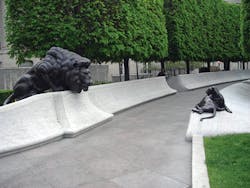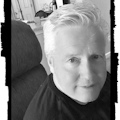Shots fired. We’re the first car on the scene. My partner and I bail out and explode through the front door of the corner bar. Bullets, blood and beer, make the floor slicker than Lake Michigan in the winter. Nevertheless, we throw ourselves into the middle of a melee that is quickly escalating and threatens to be totally out of control if we don’t try and stop it. Out of the corner of my eye, I see one combatant hide a gun in a jacket pocket. I grab him and the fight is on. We wrestle for the nickel-plated pistol that could end my career before it’s hardly begun.
It’s 1971 and I’m a rookie Chicago cop fresh out of the Army. I completed my thirteen weeks of police academy training two months earlier, but can’t recall any class covering what to do in a bar fight, particularly one that involves a gun. Life experience kicks in, as does my knee to the man’s groin. We wind up where most fights do - on the floor. Luckily, I’m on top and I pin the man’s arms. After what seems like an eternity, help arrives and several patrons are cuffed and stuffed into the back of a paddy wagon.
I quickly replay the incident in my head, but I don’t begin to shake until I’m safely in the car with my partner. He turns to me and says, “Good job, kid, that a**hole coulda killed us. I never saw the piece he had.” I take inventory of myself as we drive to the station to complete the paperwork - ripped pants and a bump on my head that’s going to make it difficult to wear my uniform hat. “That guy wanted to kill me,” I thought to myself. “But he didn’t.” Then I smile.
Why would anyone want to be a cop, particularly when one realizes the dangers involved? What causes someone to rush toward gunfire, while others flee from it? Who wants to subject themselves to ridicule, taunts, name-calling and oversight by local, state and federal entities? If you answered, “me,” you are probably a cop.
My first thoughts about the profession began to surface in grammar school. Friends and I used to play cops and robbers on the playground. (Yeah, I know, kids aren’t allowed to do play that game anymore . . . or tackle football, tag, it, or dodge ball - all too violent and politically incorrect). However, back then it was acceptable and popular. I never wanted to be a bad guy; I always wanted to be one of the cops. We’d chase each other, make believe we were in cop cars, and make siren noises. When we would catch the crooks, we’d pretend to handcuff them and haul them off to jail.
In high school, the make believe games morphed into football and hockey, but the theme remained the same. I was one of the good guys. I represented my school and played as hard as I could.
I grew up and learned that being a cop was not a game, and that there really are good guys and bad guys. As a kid, I never realized how horrible the bad guys were. I soon found out. After high school, I joined the Army. I wanted to serve. I wanted to do something worthwhile for my country. Afterward, I became a member of the Chicago Police Department because I still had the desire to help, to serve, to be one of the good guys. More than twelve years later, I left the CPD to become an FBI agent. In that capacity, I continued to serve and help others on a much broader scale. However, the theme remained the same throughout my tenure with the Army, police department and FBI: stop the bad guys from hurting the innocents.
I don’t think I’m unique in my career choice. Most cops feel the same way; they choose law enforcement because they truly believe they can make a difference. Whether it’s saving someone’s life, finding a missing child, or settling a domestic dispute, they put themselves out there to help others. They run toward danger, not from it. As we recently observed in Boston, the smoke had not even cleared before the cops were there helping the innocent victims. Courage.
Sadly, some of our men and women don’t make it home at the end of their shift, and their families never see them again. These brave individuals sacrificed their lives so that others may live. As of April 17, 2013, thirty-three officers have perished in performance of their duties. Their names will soon be added on the LE Memorial in Washington, D.C., alongside those of their colleagues who have similarly been called to be with the Lord.
This year’s National Police Week is scheduled from Sunday, May 12th through Saturday, May 18th. If you have never attended this sacrosanct event, prepare yourself for a flood of emotions. The enormity of what police officers and their families endure to ensure everyone’s safety is painfully apparent during the weeklong event. Watch as spouses, sons and daughters, mothers and fathers, brothers and sisters, touch their hands to their loved one’s inscribed name on the low-slung wall of the Memorial. Try to hold back tears during the Candlelight Vigil, as the names of the officers are solemnly read aloud. I guarantee it won’t be easy. Each time I visit the Memorial and brush my fingers over the half dozen names of officers I’ve known, I say a silent prayer of remembrance and thanks. Heroes.
Why did I become a cop? For the same reason that all of you did - because we were called. It’s not a job, it’s a vocation. You don’t become a cop for the money; you serve because you want to make a difference. Most times we love what we do. Sometimes it’s almost more than we can handle. There is no other calling that compares to that of a cop, nor are there any finer men and women. My thanks to each of you for your service, and my prayers that St. Michael with watch over you.
Stay safe, Brothers and Sisters!
About the Author
John Wills
John M. Wills is a former Chicago police officer and retired FBI agent. He is a freelance writer and award-winning author in a variety of genres, including novels, short stories and poetry. John also writes book reviews for the New York Journal of Books, and is a member of the National Book Critics Circle. His new book, The Year Without Christmas, is available now. Visit John at: www.johnmwills.com.

